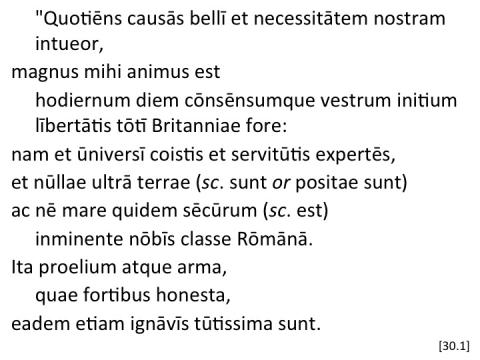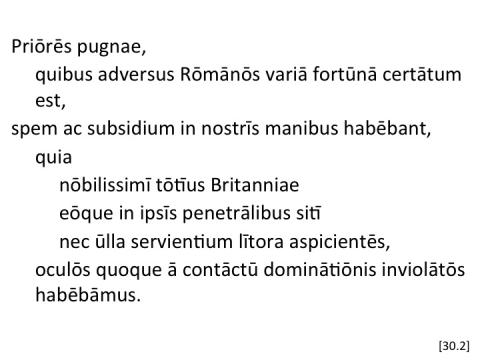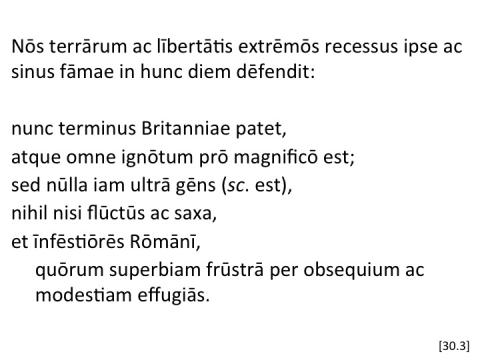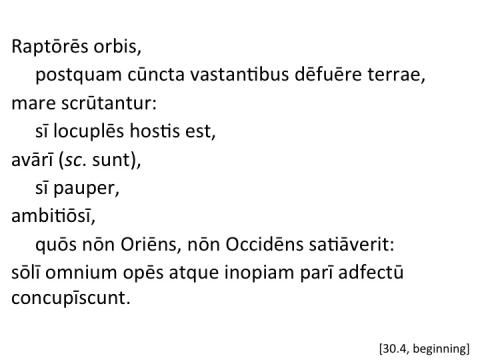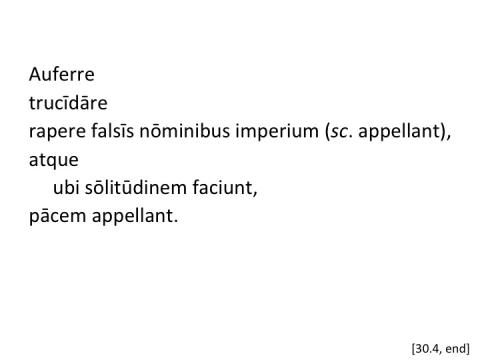Overview: “‘Now's the day and now's the hour;’ battle is our only recourse; we must conquer or die, for we have no place of refuge or hope of mercy.” (Stuart) As a rhetorical masterpiece, this speech has few equals in ancient historiography. Among the conspicuous features of its artistic construction attention may be drawn to the following: Anaphora (30.4; 31.2; 32.2; 32.4), polysyndeta (30.1; 31.2; 31.4; 32.4), asyndeta (30.3; 30.4; 31.3; 32.2; 32.3 (2x)), antithesis (30.1; 30.4; 31.1 (2x); 31.2; 31.3; 32.1; 32.4), synonymic combinations and fullness of expression (31.1; 32.2 (2x); 32.4), libration of clauses (30.1 (2x); 30.4; 31.1; 31.2; 31.3; 32.1 (2x); 32.4), poetic and epigrammatic expressions (30.1; 30.2 (2x); 30.3 (2x); 30.4 (2x); 31.1; 31.2 (3x); 31.3; 31.4; 32.1 (2x); 32.2 (3x); 32.3), and, above all, it should be observed that the three qualities which, according to Cicero, are essential to an artistic style, namely, symmetry of collocation, euphony, and rhythm, are all in evidence in this speech, the two most favored rhythmical clausulae, namely, the ditrochaeus and the cretic, being also specially frequent. ... . (Gudeman); this chapter begins on f. 60v of the codex Aesinas.
30.1
causās bellī: "the oppressions and outrages to which we are subjected." (Stuart); the chief of these is the insatiable avarice of the Romans. (Gudeman)
necessitātem: "our present plight." (Gudeman); these points are developed in inverse order. The speaker deals with their necessitas in this chapter and takes up the causae belli in ch. 31. (Stuart)
magnus mihi animus est: “I have a great confidence,” has the usual construction of confido and spero. (Pearce) animus = spes, “hope.” (Gudeman)
hodiernum diem: “this selfsame day.” The speaker chooses a more emphatic expression than hunc diem. (Stuart)
initium lībertātis, etc.: a sentiment very common in speeches of this nature, the latter alternative being here shrewdly reserved for the close (ch. 32), when the speaker could feel that his words had taken effect. (Gudeman)
ūniversī coistis: "you have assembled with all of your troops." coistis, which refers back to the troop muster described in 29.2-3, is an emendation for a defective word in the manuscript: the scribe scratched out the letters between o and t but failed to supply the intended correction (see line 17 of the left-hand column). Other editors adopt other repairs (see next note). (Damon) ūniversī colitis: “you dwell as a people.” The chapter contains two reasons for confidence in success: (1) Owing to their situation, they have not been demoralized by the sight of servitude; (2) lack of refuge forces them to fight. (Stuart)
nūllae ultrā terrae: supply sunt. (Stuart); see note on ch. 10.2, nullis contra terris. Supply positae. (Gudeman) nūllae ... Rōmānā: explains necessitatem nostrum (Pearce)
sēcūrum: sc. est. (Damon); in the sense of “safety,” the ordinary meaning of the English derivative. (Stuart); in classical Latin is used only of persons. See note on incertum, 29.2. Like tutissima below, securum here means “rendering secure.” (Pearce); = tutus, not sine cura; occurs in Livy and post-Augustan writers, but is generally rare. (Gudeman)
imminente ... Rōmānā: Tacitus is fond of ending a period with an ablative absolute. See Introd. p. xxvii, #6. (Gudeman) [A&G 419]
proelium atque arma: on this fullness of expression, see note on ch. 25.3, manus et arma. (Gudeman)
30.2
priōrēs pugnae: personification. (Stuart) priōrēs pugnae ... habēbant: Tacitus speaks of the battles in terms which are strictly only appropriate to the combatants. The meaning is that the Britons in previous defeats could look to the prowess of the Caledonians to remedy their ill-fortune. (Pearce)
spem ac subsidium: an instance of Tacitean conciseness. The former encounters with the Romans were not sufficiently decisive to discourage the Britons from trying conclusions at another time with better hope of victory, nor did the enemy on any of the occasions mentioned prevent them from retreating in good order to a place of safety, when in imminent danger of defeat. The whole passage is a skillful euphemism for the ill success which had hitherto attended their efforts to expel the invaders. On the abstract and concrete combined, see note on Introd. p. xxxiv, #1. (Gudeman)
nōbilissimī: a natural boast in the mouth of a chieftain. (Stuart)
eōque: i.e. because they were the noblest race (children of the soil), they were placed where they could be least contaminated. For the Roman reply see ch. 34.1-2. (Stuart) eōque in ipsīs penetrālibus: penetralia denotes the innermost shrine in a temple. So Caledonia is here, by a bold metaphor, represented as the most sacred spot of Britain, th e nobilitas being given as the reason (eoque) why they were thus honored. (Gudeman)
sitī = positi, “positioned/located.” (Stuart)
servientium: for servitudinis. See note on ch. 4.1. The reference is to Gaul, which was supposed to be visible from more points of Britain than is possible now. See note on ch. 10.2, spatio ac caelo, and map. (Gudeman)
lītora aspicientēs: the sight of subjection begets servility, just as in chapter 24.3 it is assumed that the sight of free peoples elsewhere arouses desire for liberty. (Stuart)
quoque: much less had they personally experienced slavery. (Stuart)
30.3
nōs ... dēfendit: repeats the idea of the previous sentence under a bolder form. “We are the remotest dwellers on the earth, the last home of liberty, and up to this day fame's most secret corner has had us in its safekeeping.” (Pearce)
terrārum ac lībertātis extrēmōs: an abstract noun joined to the concrete, extremos being used ἀπὸ κοινοῦ (apo koinou); in its regular local sense with the first, figuratively with the second. See Introd. p. xxxii. So again recessus ipse, a local phrase, refers to the former, sinus famae, taken figuratively, to the latter. The ac, in consequence, is epexegetic. See ch. 26.1, and Introd. p. xxx, #18. (Gudeman)
recessus ipse ac sinus fāmae: sinus adds to recessus the idea of personal protection. See note on 4.2, in huius sinu indulgentiaque. (Pearce) sinus fāmae: a perplexing expression, but probably a metaphor suggested by sinus in its meaning of the fold of a garment. The Caledonians were, so to speak, "pocketed" apart from publicity; the outside world knew little about them and hence stood in awe of them. Translate: “our isolation and the privacy which cloaks our name.” (Stuart); refers not to mere remoteness, a signification which sinus, albeit a word of varied meanings, never has; nor would mere distance be an obstacle to rumor, for "non aliud velocius," but the Britons remained virtually unknown, because their seclusion and isolation allowed only vague rumors of their existence to reach the outside world. Translate: “Our very seclusion and this retired nook which only rumor reaches.” Both of these facts are again emphasized, ch. 31.3. (Gudeman); the unusual expression discussed in the notes above is often emended to something more straightforward such as a fama. But it is hard to see how famae would have arisen. (Damon)
atque omne, etc: another reason (besides their seclusion; for their remaining so long undisturbed). (Pearce) pro magnificō est: is “magnified” or “exaggerated.” (Pearce); the present epigram and the one closing the chapter have acquired a special celebrity. (Gudeman)
sed nūlla: i.e. "now there is an end to our seclusion and, as no retreat is possible to us, we are brought to bay." (Pearce) nūlla iam ultrā gēns: sc. est. (Damon); this had been true before, but now it had become known to the Romans. (Gudeman)
īnfēstiōrēs: "and the yet more terrible." (Gudeman); i.e. than the rocks. (Stuart)
per obsequium ac modestiam: “obedience and submission.” A frequent collocation, e.g. ch. 42.4. (Gudeman)
effugiās: indefinite second-person potential subjunctive. (Capozzi) [A&G 447.2]
30.4
mare scrūtantur: rhetorical exaggeration of the operations of the fleet. (Stuart); an intentional exaggeration, the sea serving the Romans, of course, only as a means to an end. (Gudeman)
locuplēs ... ambitiōsī: sc. sunt. (Damon); “if the enemy be rich, they exact tribute; if he be poor, they exact homage.” (Gudeman) ambitiōsī: “lustful for glory.” (Stuart); ambitiosus is used in (a) an active, and (b) a passive sense. (a) courting favour; in a good or bad sense; “ambitious,” “vainglorious.” Of things, 42.4 ambitiosa morte. (b) passive; courted for favour. So here, “seeking homage.” (Pearce)
quōs ... satiāverit: satiaverit is possibly a consecutive subjunctive representing an unsubordinated satiavit, but is more probably a subordinated potential subjunctive. (Pearce) [A&G 536, 445] satiāverit: clause of characteristic. (Gudeman) [A&G 534]
sōlī omnium: take together. (Pearce)
opēs atque inopiam ... concupīscunt: i.e. rich and poor alike are endangered by their lust of conquest. (Pearce)
30.5
auferre, trucīdāre, rapere: “robbery, massacre, plunder.” Such asyndeta are common in Tacitus. (Gudeman) auferre: “pillage” of property. (Stuart) rapere: executed on men and property. (Stuart)
ubi sōlitūdinem faciunt, pācem appellant: this sentence of Tacitus is one of the most famous utterances in Latin literature. (Stuart)
imperium, pācem: both objective complements to appellant. (Pearce) [A&G 392-3] pācem appellant: sc. eam solitudinem factam. This euphemism was much affected by the Romans, being all but adopted as the official designation for conquest. (Gudeman)

